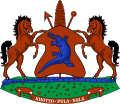| King of Lesotho | |
|---|---|
| Morena a Lesotho | |
 | |
| Incumbent | |
 | |
| Letsie III since 7 February 1996 | |
| Details | |
| Style | His Majesty |
| Heir apparent | Lerotholi Seeiso |
| First monarch | Moshoeshoe I (as paramount chief) |
| Formation | 1822 |
| Residence | Royal Palace, Maseru |
| Website | Website |
 |
|---|
The monarchy of Lesotho is the form of government used by Lesotho (also known as Basutoland until 1966) by which a hereditary monarch reigns as the head of state, with their powers regulated by the Constitution. The monarch is styled as Marena; in Sotho language, Marena is the plural of the common noun Kings, where Morena is the singular for King.
Contents
- Succession
- Compensation
- List of kings
- Kings / Paramount Chiefs of Lesotho / Basutoland (1822–1966)
- Kings of Lesotho (1966–present)
- Royal Standards
- See also
- Notes
- References
The monarch since 7 February 1996 is King Letsie III, who ascended the throne on the death of King Moshoeshoe II, his father. It is the second reign of Letsie III; his first reign lasted from 12 November 1990 to 25 January 1995.





